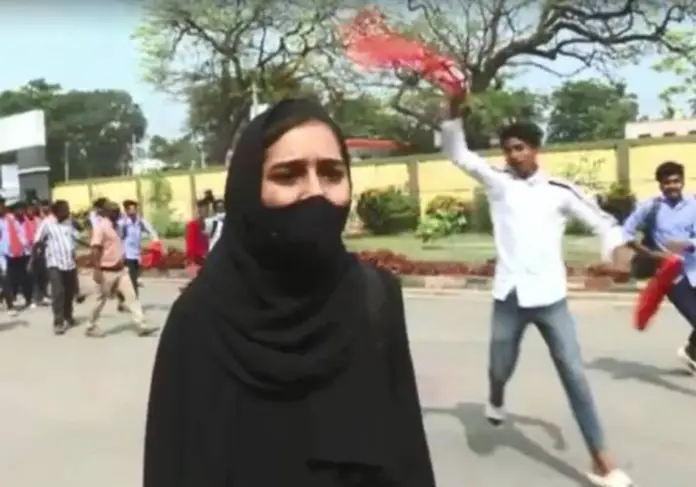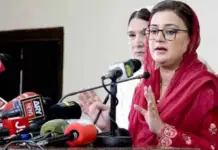Debates over the Muslim veil unfolded in Europe two decades ago before entering India in December 2021.
Pakistan condemned India’s Karnataka state’s decision to ban Muslim students from wearing hijab and summoned the Indian envoy to convey its concerns. Protests were held in in various cities after the Muskan Khan incident. The hijab-clad student, Muskan, was harassed by a mob of Hindutva supporters in Karnataka last week and retaliated by shouting back “Allahu Akbar”.
Her video went viral minutes after the incident, prompting worldwide condemnation.
Rights activists condemned the harassment of girls and many of them believe wearing a headscarf comes under the basic right of religious freedom. Politicians, religious scholars, teachers, and lawyers also reacted against the Indian state’s action. Religious parties adopted resolutions to condemn harassment of Muslim women in India and demanded that the government vigilantly fight their case at the international level. The Organisation of Islamic Cooperation (OIC) has been asked to interfere for the protection of minorities’ rights in India.
Various countries throughout the world, have at times had their provincial and federal legislatures put a ban on the hijab and veil. These include Austria, Belgium, Bulgaria, China, Germany, Denmark, Netherlands, Russia, Spain, Switzerland, and Turkey.
The question then arises why Pakistan has reacted so strongly against the Karantaka incident, summoning an Indian diplomat to express its concern, even when various countries have put in place various bans over the years.
A history professor in Punjab University sees it in a different way and said that Pakistan considered itself a stakeholder when it came to the matter of protection of Muslim rights in India.
“Pakistani Muslims have centuries old roots in India. The majority of the Muslim community in all Indian states voted for the All India Muslim League (AIML) in the 1946 elections and the vote opened the path to a new country for them,” he said, adding that the All-India Muslim League won 425 seats (26.8 percent of the total), placing it as the second-ranking party. He added that the AIML captured all Muslim constituencies in the central assembly as well as most of the Muslim constituencies in the provincial legislatures in 1946.
Islamabad, he said, could not stay aloof if New Delhi took harsh steps to sideline Muslim population.
The Minute Mirror approached lawmakers, lawyers, teachers, rights activists and religious scholars to get their reaction over Karnataka’s decision.
The women lawmakers of Pakistan severely criticised and condemned the unpleasant incident of the harassment of Muskan for wearing a Hijab. “This august House of Punjab Assembly condemns the attack on Hijab wearing girl in India in the strongest words. The Modi government is involved in the worst kind of persecution of Muslims in India,” said a resolution submitted by a Pakistan Muslim League-Nawaz (PML-N) lawmaker. The lawmaker from Punjab said that the silence of international organizations over such blatant human rights violation in India was very sad.
“I urge the international organisations to take action against India over these gross violations of basic human rights,” said Hina Butt, who has also served as the general secretary of First Women Parliamentary Caucus. She was of the view that wearing Hijab was a fundamental right of every woman and she would keep raising her voice for this right in the parliament. “The Modi government has become a shame for India itself where the space for civil society is shrinking very fast and minorities are facing worst kind of persecution,” Hina said, who has also represented Pakistan in many international forums.
Member of Provincial Assembly (MPA) Uzma Kardar, who heads the Standing Committee of Punjab Assembly on Gender Mainstreaming, said that there were a lot of women who took pride in wearing Hijab and it was “nonsense” to put a ban on it. “It is not about woman rights or religious rights, but it is about human rights,” Kardar said. She was of the view that she participated in a woman rally today where hundreds of women were wearing Hijab because it was their fundamental right to wear whatever they wanted to wear.
“Our government is very much clear about the human rights and woman rights. Pakistan has summoned the Indian envoy to record its protest over the sad incident that happened with Muskan,” Kardar said.
She added, “We have resolved the issues of inheritance laws that our women were facing for decades. The minorities are safe in Pakistan and the Kartarpur corridor is a glaring example of it. On the other hand, minorities are being persecuted in today’s India on the behest of Modi who is a believer of Hindutva,” she concluded.
Pakistani lawyers believe that banning hijab in the western states might not be like the case of India, because they have different cultures. However, India is a country where Hindus and Muslims and people from many other religions are living together for centuries.
“This is more than a cultural issue in India, because Muslims and Hindus have been living there together for centuries,” said Senator Ali Zafar, who is also a prominent lawyer. Zafar said that culture was important and clothing was part of culture and nobody had the right to make a comment on any other person’s clothing. Quoting renowned scholar Noam Chomsky, Zafar said that what was happening in India was Islamophobia.
“In Europe, it might be different, because there is no such compulsion. Nuns wear a particular dress but nobody dares to object to them,” said Zafar. Likewise, he said, Sikhs wear turbans, Buddhists had their attire and so did followers of many other religions, but nobody criticized any of them.
“Until the disposal of the case, the Karnataka High Court should not have banned hijab,” he further said, pointing out that it was injustice and against the freedom of practicing religion.
Advocate Sheeba Qaisar opined that wearing Hijab was a fundamental right and personal choice of any individual and that banning it was against that right. She said the world community needed to act against religious freedom.
“Nobody can force any woman if she does not want to wear Hijab even in a Muslim community. There is no concept of forcing anyone,” she argued, pointing out that the situation in Pakistan as compared to India was far better, because nobody from any other religion criticized any woman on her dress code.
“The UN General Assembly resolution 144/53 gives the right to every citizen to exercise his or her religious freedom. The resolution was adopted in 1998,” said Dr. Farid Paracha, a religious scholar and a leader of Jamaat-e-Islami.
He said India had emerged as the most difficult country for minorities in today’s world. Muslims, he said, were the major target of the Modi government, adding that the BJP-RSS agenda to turn India into a Hindu state had been exposed badly. Paracha condemned the silence of the international community over Muslim genocide. He said that Pakistan should vigilantly fight the case of the marginalisation of Muslims in India. He said that Islamophobia had also emerged in India alongside Europe. The harassment of Muslim women had become a routine in the West and Hindutva mobs were targeting Muslim women all over India, he added.
Interfaith Cleric Council Chairman Maulana Asim Makhdoom, said the incident of Muskan Khan was a wakeup call for Indian Muslims. They should join hands for the protection of their rights, he said. It was the duty of the OIC, he stated, to devise a practical plan to protect the religious freedom of Muslims where they existed as minorities. He added that the United Nations should devise laws for religious freedom and protection of the sanctity of every religion.
Hundreds of women also held a protest in Lahore last Thursday against India for banning the Hijab. JI leader Samia Raheel Qazi led the protest and said that India’s so-called secular face was badly exposed after the recent ban on Hijab. She said that the worst human rights abuses continued all over India against minorities and the Muslim community had become the target of Hindutva ideology from occupied Kashmir to Karnataka. She added that the world was silent because of the Indian economy, which provided opportunities to multinationals to take advantage of its market and earn billions of dollars.
Qazi opined that the dual face of the international community was exposed when it came to the matter of Muslim rights. She added that the JI would fight for the Muslim daughters and sisters in India and raise a strong voice for their rights all over the world.
The protest demonstrations, which took place in front of the Lahore Press Club, were organised by JI and the Awami Rickshaw Union women chapter in favour of Muslim women in India.
Holding placards and banners, the protestors chanted slogans against the Modi government’s act of marginalizing Indian minorities and particularly targeting Muslims.
The protestors demanded that the government take up the issue of human rights’ abuses in India at the international level as the Muslim community had become a permanent victim of the crimes of Hindutva goons.
Civil rights activist Farooq Tariq condemned the event and said that this had proven that fundamentalism and radicalism was on the rise in India. “Muskan has become a symbol of courage for all the women in the world. She fought for her basic right of whatever she wants to wear,” he said, adding that the women organizations in Pakistan had the same motto of resistance for self-rights like Muskan had.
Tariq believed that there was no contradiction between Muskan’s actions and the slogan “Mera Jism Meri Marzi ”. Calling India a so-called liberal state, he said that under the Modi regime, fundamentalism and radicalism had reached extreme levels. “We can see fundamentalism and extremism has risen in India since Modi came into power,” he said, adding that this was not just the matter of India. He explained that throughout the world, wherever fundamentalists were backed by states, citizens were deprived of their fundamental rights.
“It is a woman’s discretion what she wants to wear or not. Muskan has proved that women can defend their rights even while wearing a hijab,” Tariq said and added that Pakistan was also facing such problems where the state had failed to protect human rights under Imran Khan’s leadership.
Punjab’s Ambassador for Transgender Education Ayesha Mughal argued that every person had the right of freedom and wearing any dress of their choice was one of the basic rights of everyone in society. “Nobody can be stopped from using any of the fundamental rights as the United Nations General Assembly’s resolution provides equal rights to every citizen,” said Mughal.
She said that extremist incidents in India had risen and discrimination toward minorities had also become a common routine. “Barring hijab in India’s colleges is an unacceptable and condemnable move, which is meant to deprive women from their rights of freedom,” she said. She added that in challenging her institute’s move of banning the hijab, Muskan inspired women around the globe on how to resist when they were being deprived of their rights.
Mughal was of the view that in India, such incidents were happening because of the state’s fundamentalist policies. “Besides Muslims, other minorities are also not safe in India,” she said, and added that no society could be strengthened unless equality prevailed there.
Women activist and writer Tehreem Azeem said that no one had the right to interfere with anyone’s personal life and the matter of clothing was someone’s personal choice. She said that India’s Muskan had emerged as a symbol of resistance against status-quo and fundamentalist approaches.
Dr. Aysha Ahmed, a political science teacher from Lahore said that recognition of someone’s identity and denial of religious markers was a social issue in the secular state of India. She added that it reflected the orthodox mindset that created the stigma of ‘Otherization’ based on religion and ideology.
She further said that Indian society was deeply divided and currently unable to appease religious and ethnic contraventions. Therefore, according to the Indian constitution, all religious identities were supposed to exist and flourish, but the social rigidities backed by radicals constrained inter-faith harmony, she held.







